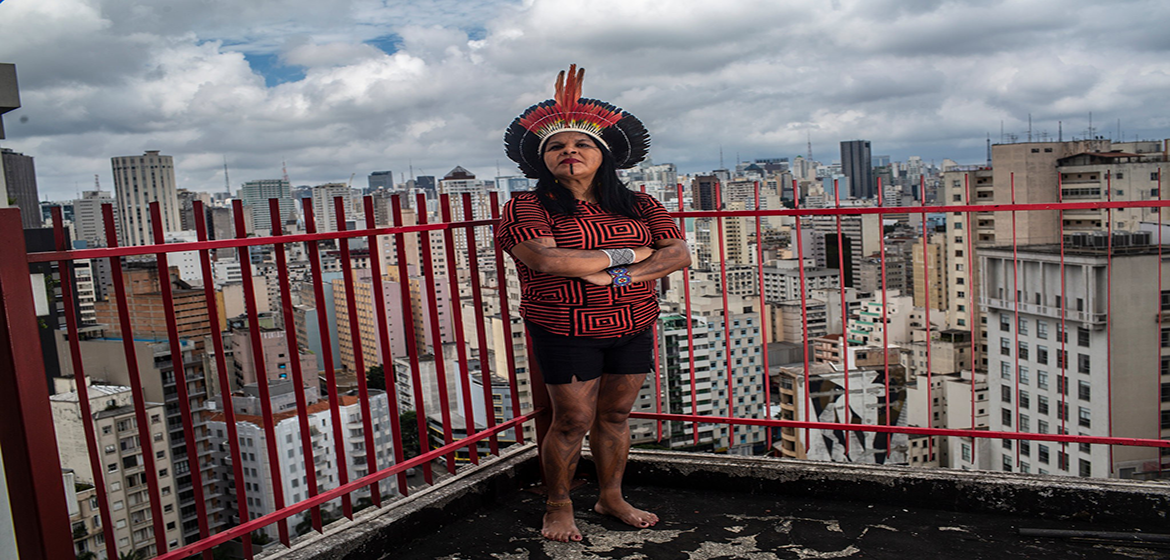Indigenous leaders battle to save their land and their way of life.
By Carol Giacomo
The indigenous peoples of the Amazon rain forest are the shock troops in the struggle against climate change. “We are the first ones to be affected,” says , one of Brazil’s best known indigenous leaders.
“We’re seeing floods that last longer, we’re seeing droughts that are longer, we’re seeing a reduction in fish with the drying out,” she recently told The Times’s editorial board. “And so it affects our food security. It also affects our culture.”
The , an environmental treasure of more than two million square miles across Brazil and eight other countries, is sometimes called “the lungs of the planet” because the trees release so much oxygen and absorb so much carbon dioxide, mitigating the effects of climate change. It is also home to an unparalleled diversity of animal and plant species as well as roughly people in Brazil alone.
Although long imperiled, the forest is at greater threat now under the presidency of a polarizing populist leader in the mold of President Trump who took office in January and will meet Mr. Trump at the White House on Tuesday.
Mr. Bolsonaro moved quickly to , indigenous land rights, nongovernmental organizations and basically anyone who disagrees with him.
“Just in the first 50 days of the Bolsonaro government there has been a reversal of 30 years of progress,” Ms. Guajajara said. “Everything we have been trying to construct, trying to build since then, we are trying to keep standing.”
![]()
Smoke rising above the Amazon rain forest outside an indigenous reservation in Roraima State, Brazil. Credit Dado Galdieri/Bloomberg
Her work with Brazil’s Association of Indigenous Peoples centers on securing their rights, including claims to ancestral rain forest lands. Brazil lost nearly between 2000 and 2017, according to the World Resources Institute. Now Mr. Bolsonaro is raising the threat even more with a to exploit the country’s forests, minerals and other natural resources.
, Mr. Bolsonaro has weakened or defunded government agencies that oversee protections for the Amazon and indigenous people and given those responsibilities to the pro-farming, pro-mining, pro-timber agriculture ministry.
The result is that indigenous people, who have secured government protection for about 13 percent of Brazil’s territory, fear there will be no more lands set aside, Ms. Guajajara said.
Lands that are formally recognized as “collective lands” are owned by the government but guaranteed under the Constitution for the exclusive use of indigenous groups. Mr. Bolsonaro says he wants those lands made “more productive.”
Ms. Guajajara, who in the recent election as a candidate of the leftist Socialism and Liberty Party, said that would mean the beginning of the end to indigenous cultures. “And for me, that’s kind of ethnocide,” she said. “Ethnocide is when you kill the culture. Genocide is when you kill the people.”
Wiser leaders than Mr. Bolsonaro would look for ways to expand economic development while also respecting the indigenous tribes and recognizing the Amazon’s irreplaceable contributions to halting climate change. indigenous communities are better stewards of the land.
Brazil has a history of conflict over development and conservation. That is now playing out in a civil suit that when hundreds, maybe thousands, of tribe members died between 1968 and 1977 as a highway was forcibly being built through the Amazon, .
At a hearing in a remote Amazon reserve last month, six tribal elders told a judge how the military dictatorship had tried to eradicate them with arms, bombs and chemicals.
Now, decades after that period, according to Ms. Guajajara, Mr. Bolsonaro is asserting “there’s no such thing as an indigenous people” and insisting he wants to “unify us all into one culture.” That is offensive and unrealistic, given that Brazil encompasses more than .
At least, Mr. Bolsonaro’s election seems to be making clear what could be lost to his policies and to be persuading marginalized groups — the poor, women, children, indigenous people — to unite in common cause.
The Bolsonaro election also calls into question the fate of a proposal by an international coalition of Amazon indigenous groups to the last year to create a rain forest sanctuary the size of Mexico.
If there is hope for the rain forest, and for countries where authoritarians threaten democracy and progressive agendas, it lies in the determination and power of civil society activists like Sônia Guajajara.
Source:
Related to SDG 13: Climate action and SDG 10: Reduced inequalities



